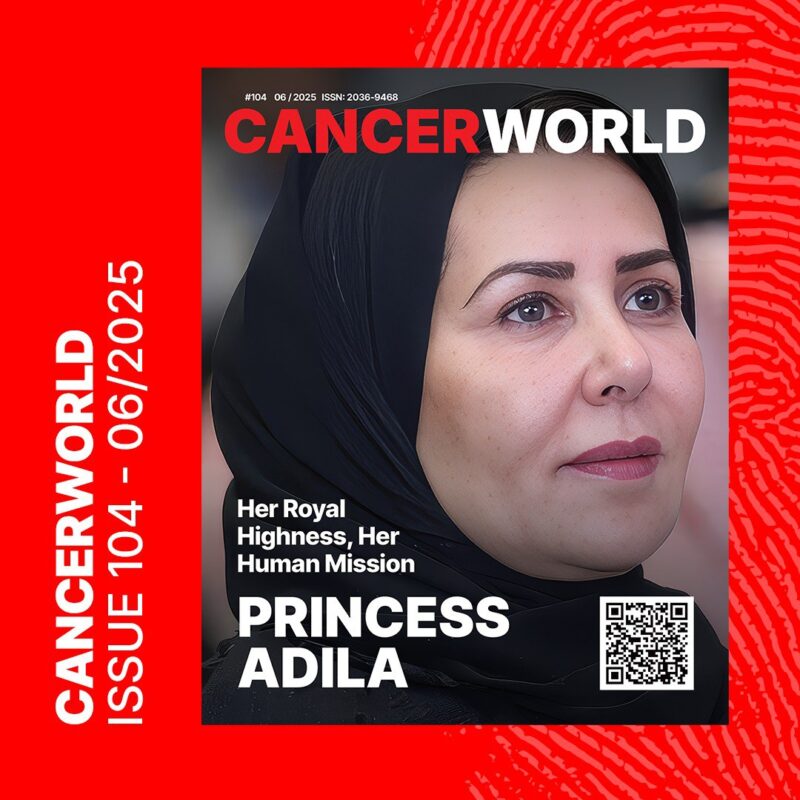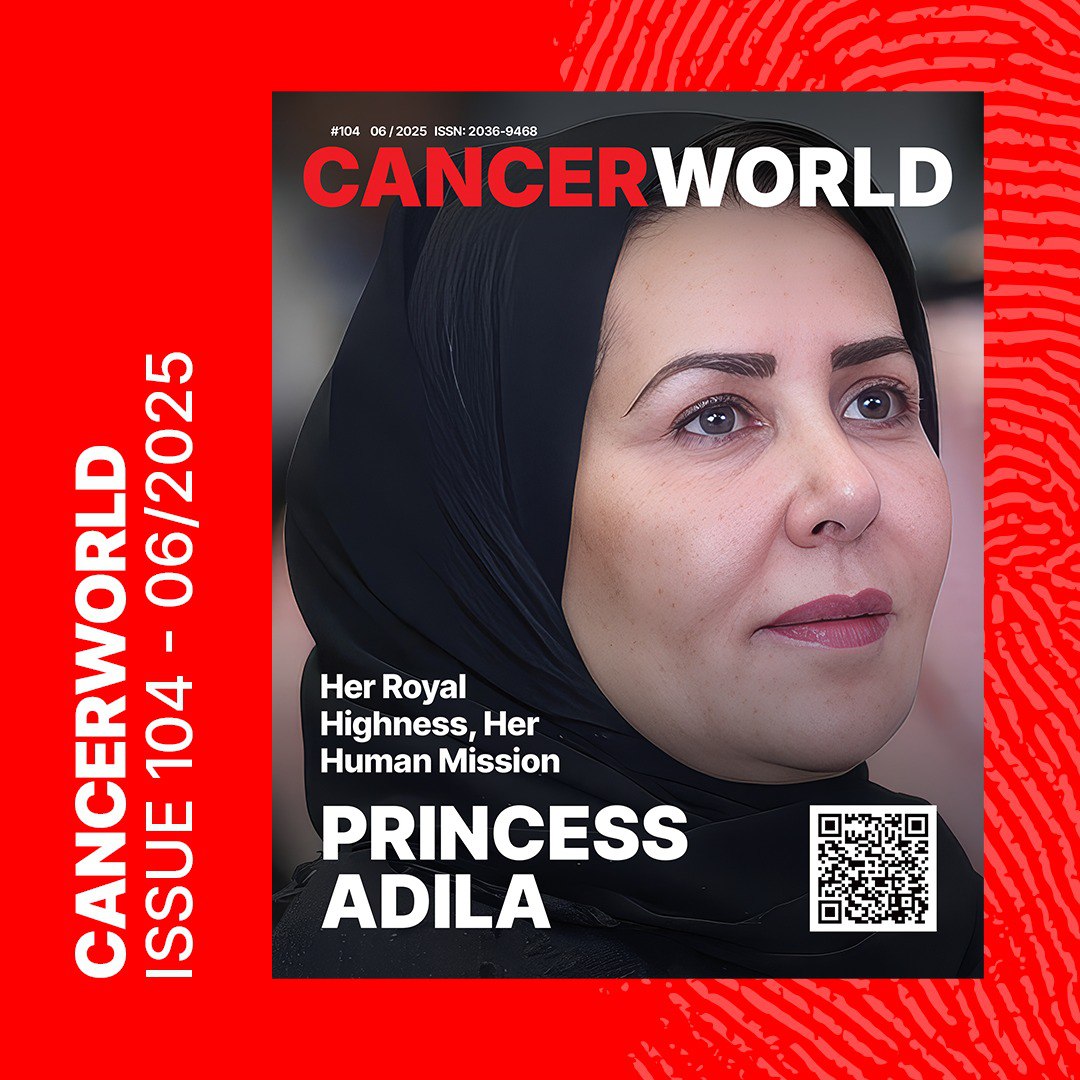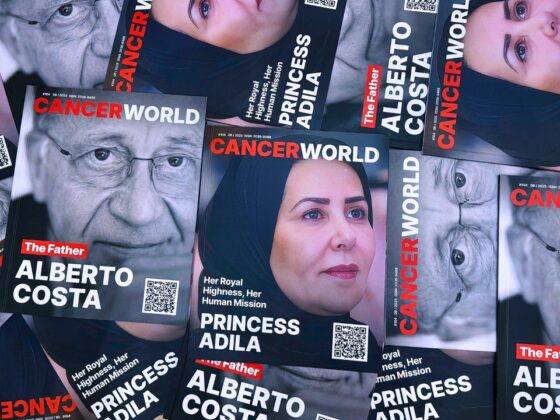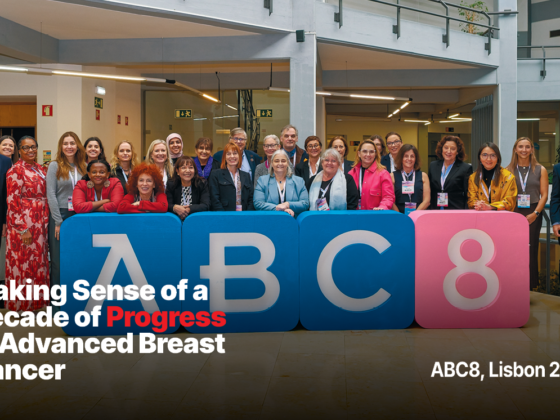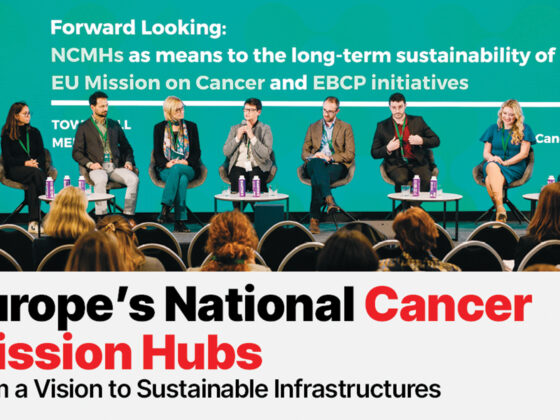Inside the remarkable journey of Princess Adila bint Abdullah Al Saud. An exclusive interview for CancerWorld.
When I entered the room, it felt as though I had stepped into a page from an Arabian fairytale. The room was quiet and serene, adorned with elements of nature and refined décor that evoked calm and timeless elegance. Then Her Royal Highness arrived.
Despite a tightly packed schedule and knowing I would be leaving within a few hours, Her Royal Highness Princess Adila bint Abdullah Al Saud graciously made time for the interview. Instantly, her presence brought clarity: kind, calm, wise, and noble, her grace was unmistakable. In that moment, it was easy to see why she is a transformative figure in Saudi society: a strong advocate for women’s rights, a champion for social justice, and the chairperson of the Sanad Pediatric Cancer Foundation.
No Child Left Behind
“I’ve always believed that healing goes far beyond medicine,” says Princess Adila bint Abdullah Al Saud, reflecting on her decades-long commitment to improving the lives of children with cancer. “It’s about human dignity, compassion, and making the burden of illness just a little lighter.”
Her journey with Sanad, one of the Kingdom’s most impactful cancer support organizations, began in 1999. But her vision for healthcare reform took root even earlier.
“I had already started the National Home Healthcare Foundation in 1997,” she explains. “It focused on stable patients, helping them transition from hospital to home with proper medical support. But when friends of mine, one of whom had a child in King Fahd Center, noticed the immense social and financial hardship of many families, I knew we had to do more.”
Sanad began as a personal mission. “It was just a group of women determined to help. We saw the need, we talked to the hospitals, and eventually we made it official. We got licensed and began supporting families of children with cancer more formally. But at its core, it was always about compassion.”
That spirit has never changed. “Today, our mission remains: no child left behind. And that includes children who are not Saudi, who aren’t eligible for free healthcare here. We help them too, because suffering doesn’t recognize nationality.”
Princess Adila shares a particularly moving story from a recent hospital visit.
“There was this little girl, she had been admitted through the emergency room and started treatment immediately. But because of her refugee status, she couldn’t be released. If she left, she wouldn’t be allowed back in. So she stayed in that hospital room for nine months. Imagine that, nine months.”
She pauses. “Her family had to split. The father kept working, siblings were elsewhere. Only the mother stayed with her. Eventually, we intervened and helped with the paperwork. Seeing her reunited with her family was… incredible. That moment stays with you.”
The Human Cost of Disparities
Despite her humility, it’s clear Princess Adila bint Abdullah Al Saud is deeply involved. “I’m not a centralized leader,” she says. “I believe in empowering others. But I visit hospitals, I meet the families. I hear their stories. And every time, I’m reminded how strong these children are. They are the heroes, not us.”
Her work has taken her far beyond hospital walls. She speaks with urgency about global disparities in cancer care.
“Eighty-five percent survival in wealthy countries. Ten to twenty percent in others. It’s unacceptable. These families are not just fighting cancer—they’re fighting poverty, malnutrition, and systemic neglect.”
She describes an initiative launched by the King Abdullah Foundation: five floating hospitals in Bangladesh. “They go into rural areas by river, bringing care directly to those in need. It’s more than healthcare—it’s about building trust. Many of these families are scared of hospitals. Volunteers have to bridge that gap.”
For Princess Adila, this is a matter of justice. “When we wake up, we have clean water. Food. Healthcare. These families wake up wondering if their child will survive the day.”
Her concern extends to children in conflict zones.
“I don’t know what ‘humanity’ means anymore,” she says, visibly shaken. “Hospitals are bombed. Medical workers are attacked. Children are trapped in sieges with no medicine. And the world watches. Institutions meant to protect us are failing.”
Still, she insists on speaking out. “Yes, it’s dangerous. Yes, people are silenced. But it is our duty to speak. Especially when children are dying because someone decided their lives don’t matter.”
Empowering Women
She shifts to a more hopeful note when discussing her advocacy for women’s rights. “I believe that if a woman is financially independent, she has power in her home, and in society.”
Her work with the Khadija bint Khuwaylid Center, under the Jeddah Chamber of Commerce, aimed to do just that.
“We weren’t forcing women to work. We were giving them the option. And we helped businesses open their doors to women, especially low-income ones.”
She recalls working with Batterjee Pharma. “They built a segregated workspace for women, added a nursery so mothers could bring their kids—and their profits rose 40%. These women—some of them single moms—became providers. It changed lives.”
Transportation was a hurdle. “Women couldn’t drive then, and half their salary went to hiring drivers. So the company sent buses to pick them up. Again—a win-win.”
She smiles. “Dr. Batterjee became a role model. He took a risk. And others followed.”
It’s this mix of realism and quiet determination that defines Princess Adila’s work. She doesn’t seek the spotlight. But her fingerprints are on some of the most meaningful social reforms in the Kingdom.“I don’t want to lead for the sake of leading,” she says. “I want to serve. That’s what matters.”
The warmth of Saudi Arabia
“There’s a perception about Saudi Arabia,” says Princess Adila bint Abdullah Al Saud, reflecting on how international visitors often expect something far more rigid and uninviting. “But when people come, they’re surprised by the warmth. You need to be here, to feel it.”
I echoed her point, sharing my own surprise: “I was expecting formality and distance. But what I found was openness, civility, and kindness.”
Princess Adila bint Abdullah Al Saud smiles. “That’s why it’s important to visit and not just believe what you hear from afar.”
“You learn, you build relationships, you grow”
While widely associated with educational progress, she humbly clarifies her role. “Education was always my husband’s path—he served as Minister of Education. We worked in parallel, exchanged ideas, but I was never directly involved.”
Instead, she poured her energy into cultural heritage. “I volunteered at the National Museum for ten years with a group of seven women. Our mission was to make the museum more inviting, especially for children and families who saw it as a place only for the elite.”
They organized events and designed school programs that moved classroom lessons into museum exhibits. “History became tangible,” she explains. “Children learned by experiencing. That had a deep impact.”
Eventually, this program expanded from private schools to public ones, creating a model of educational inclusion through cultural spaces.
As for the widely praised international scholarship program, she gives credit to her late father, King Abdullah. “The scholarship program began long ago, during King Saud’s time. But my father expanded it dramatically. He believed it wasn’t just about academics—it was about culture. He used to say: your values don’t weaken by knowing others—they become richer. You learn, you build relationships, you grow. And he practiced that. On every trip, he made time to meet with students abroad—he called them his sons and daughters.”
What Does It Mean to Be a Princess?
Asked what it means to be a Princess, she responds without hesitation: “Responsibility. You try to be a role model, and that’s not always easy. But you try.”
To the younger generation, her message is equally clear: “Never stop learning. And be confident in your identity. I hate the dilution of cultures. I love seeing a country keep its own character—its own craft, language, rhythm.”
On building teams, she emphasizes inclusion and humility. “I’m not sure what model I follow, but I believe in diverse expertise. No one person sees the whole picture. When we come together from different angles—social, financial, clinical—we make fewer mistakes.”
She believes wisdom can come from anywhere. “You learn from doctors. From drivers. From the janitor who cleans the office. If your mind is open, learning never stops.”
When asked about her favorite book, she pauses thoughtfully. “I don’t have just one. But I love biographies, real lives, real stories.”
One she found unforgettable was the two-volume autobiography of Jamil Hijelan. “It spans seven Saudi kings. He wrote about his childhood, his mother raising him alone, his years in Syria and Egypt. It was vivid and deeply human. I couldn’t put it down.”
She’s currently reading the memoir of Amr Moussa. “It’s a harder read, but relevant—especially with everything happening in Gaza. It gives historical context and foresight.”
And yes, she’s writing her own. “I’m nearly finished. Just in revision—but it feels like that revision may never end,” she laughs.
Asked for an exclusive, she promises: “Once it’s done, I’ll give you the first interview. And yes—it includes a chapter about Sanad, and every initiative I’ve supported.”
Finally, when asked whom she would recommend for the next interview, she smiles warmly.
“Princess Haifa Faisal,” she says. “Not because she’s my cousin, but because she has remarkable stories to share. I’m sure you’ll find them inspiring.”
After a few hours, I was on the plane, leaving the Kingdom of Saudi Arabia, deeply inspired by the beauty of the country, the warmth of its people, and the masterclass of wisdom from my final interview with a leader whose quiet strength moves nations and whose heart remains firmly with those she serves.

